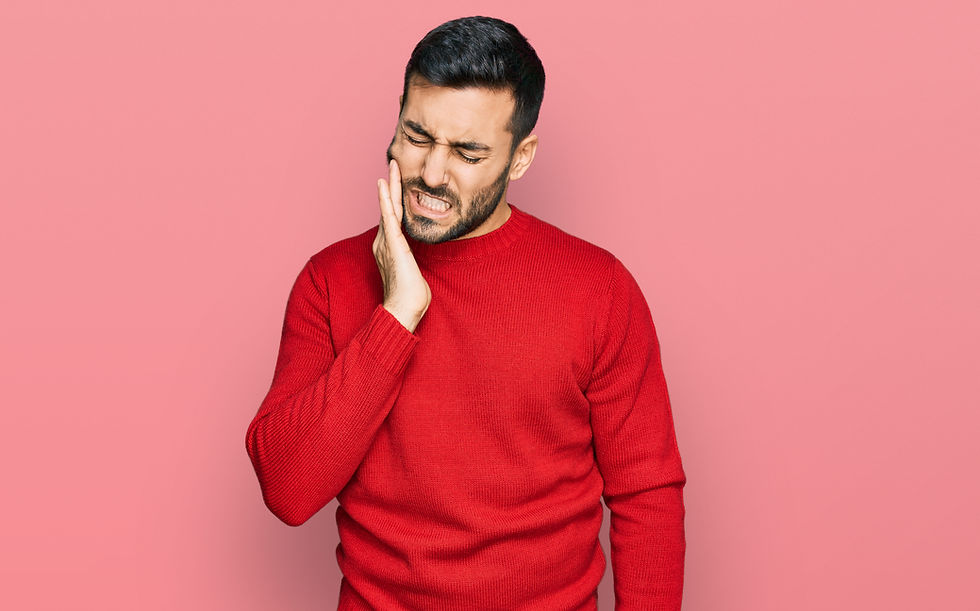Tips From Expert Dentists to Say Goodbye to Bad Breath
- Dr Gurinder Matharu

- May 17, 2024
- 4 min read
Updated: Sep 1, 2025

Since bad breath, also called halitosis, is something about 31.8% of adults and teens around the world have to deal with, a quick mint or even some gum will seem to get rid of it or lessen it. However, it can sometimes mean bigger problems. Bad breath can cause embarrassment, but it could also point to some other underlying health issues. So, before going into some DIY method of dealing with it, it is best to contact your Dentist.
In this blog, we will learn about the causes of bad breath and ways to deal with it. Read on for useful solutions.
What is Bad Breath?
Bad breath, or Halitosis, is a common dental problem that can greatly affect your confidence. It has many causes and various ways to treat it. According to research, around 1 in 4 people suffer from bad breath almost regularly. Halitosis is the third most common reason people go to the dentist, the first two being tooth decay and gum disease.
Sometimes, simple changes like better brushing or quitting smoking can eliminate bad odour. But if it persists, it’s best to seek professional advice from a specialist in halitosis treatment to rule out any underlying health conditions.
Symptoms of Bad Breath
Here are some signs that you may have halitosis or bad breath:
Unpleasant taste in your mouth: This may be caused by dry mouth or medications.
Dry mouth: Lack of saliva can also cause bad breath.
Persistent foul odour: This is the most noticeable symptom, whether to yourself or others.
Signs from Others
While it can be awkward to ask someone out directly, there are some subtle signs to look out for:
People may step back a little or cover their noses during a conversation.
You may have noticed other people offering you mints or gum more often than usual.
If you are not sure about your breath, it will not hurt to get an honest opinion from a trusted friend or recommence a visit to a Family Dental near Camden facility to have the breath evaluated more professionally.
Reason Behind Bad Breath
There are various common reasons for bad breath, including:
Cigarettes & Tobacco: These products harm your health and cause bad breath.
Dry Mouth: When saliva production decreases, your mouth cannot clean itself naturally, leading to bad breath.
Poor Oral Hygiene: The food particles left after eating turn into bacteria and release foul-smelling gas.
Poorly Fitting Dental Appliances: Dentures and veneers that don’t fit properly can trap food particles and bacteria.
Medications: Some medications can cause dry mouth or release chemicals that lead to bad breath.
Infections: Tooth decay, gum disease, or mouth ulcers can be the main causes.
Other Conditions: Medical conditions such as tonsil stones, runny noses, GERD, and some cancers can also cause bad breath.
Foreign Objects: For young children, food or other objects stuck in the nose can cause bad breath.
How to Cure Bad Breath?
If you are bothered by bad breath, there are several simple steps you can take to improve your breath or cure halitosis. Here are some suggestions:
Brush & Floss Daily: Brush your teeth twice a day to remove food particles and bacteria. Don't forget to floss and clean your tongue daily.
Quit Smoking: Quitting tobacco products will significantly improve your breath.
Stay Hydrated: Drink plenty of water – about 3-4 litres a day – to keep your mouth hydrated and reduce bad breath.
Consider Mouthwash: Use an antimicrobial mouthwash to kill bacteria and freshen your breath, but avoid alcohol-based mouthwashes that can dry out your mouth.
Visit Your Dentist Regularly: Have regular dental check-ups to rule out any possible underlying problems, such as gum disease or tooth decay.
Following these steps, along with other procedures to treat and prevent bad breath, can be a great help. Bad breath mints may be a very temporary solution, and it is always important to get to the bottom of the issue, whether it's poor brushing or a medical problem.
Best Mouthwashes for Bad Breath
Some mouthwashes are designed to treat bad breath. When choosing a mouthwash, choose one with antimicrobial properties that kill halitosis-causing bacteria. Avoid alcohol-based mouthwashes, as they may dry out the mouth, which could make the problem worse.
Recommended mouthwashes include:
Listerine Total Care: Known to kill bacteria and promote overall oral health.
CloSYS Mouthwash: A gentle, alcohol-free option that neutralises bad breath without drying out the mouth.
TheraBreath Fresh Breath Oral Rinse: This mouthwash fights the causes of bad breath and provides long-lasting freshness.
Always consult your dentist to find the right mouthwash for your specific needs.
When to See a Dentist
Although most cases of bad breath can be managed with home remedies, it is important to consult a specialist in the following situations:
You have bad breath despite good oral hygiene.
You suspect it may be related to an underlying medical condition.
You also have other symptoms, such as dry mouth, mouth sores, or pain when chewing.
Conclusion
If you have temporary halitosis, it is time to consult an expert for halitosis treatment. A dentist or dental hygienist will find the root cause and treat it so that you do not have to live with bad breath any longer.
For expert help with bad breath and halitosis treatments, book a visit at Bradbury Dental Surgery today. Our skilled team will assist you through the whole process toward a fresh breath and a healthy mouth.



Comments